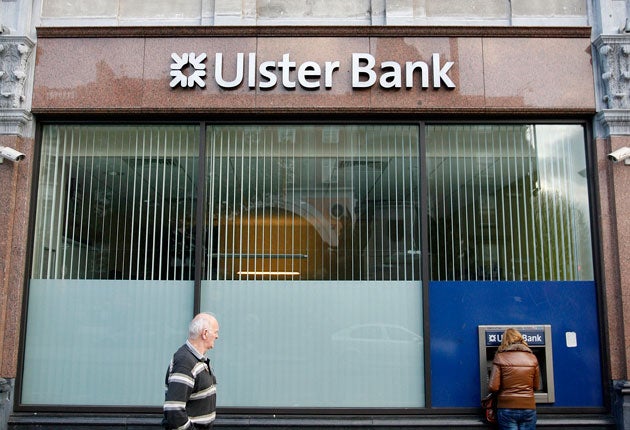UK banks suffer fallout from across the Irish Sea

Banking shares went into a tailspin yesterday as investors took fright and deserted Lloyds Banking Group and Royal Bank of Scotland as a result of their exposure to Ireland's crisis-wracked economy.
The tax-payer majority owned RBS fell 1.93p to 39.84p not least because of its ownership of Ulster Bank and the fact that nearly 30 per cent of its Irish mortgages now represent 100 per cent loan to value of the properties on which they were advanced. That made it the biggest loser on the FTSE 100 in percentage terms. Lloyds Banking Group was close behind in second, its shares finishing down 2.79p at 63.93p. Barclays closed down 4.2p at 270p while HSBC lost 3.7p to 653.8p.
While the latest developments over the proposed Irish bail-out initially sparked a rally on the FTSE 100, shares swiftly went into reverse as uncertainty over how it would work combined with a growing political crisis in Ireland rattled investors confidence. David Buik, partner at BGC Partners, said: "This is all about uncertainty. The politicians appear not to understand that uncertainty is something that the markets just cannot deal with at the moment and the longer that they prevaricate for the worse it is going to get."
In a recent research note, Morgan Stanley calculated all European banks' exposure to the three most vulnerable countries on Europe's periphery, unflatteringly called the PIGS – for Portugal, Ireland, Greece and, finally, Spain. Its analysts put Royal Bank of Scotland's total exposure to Ireland, in the form of loans, mortgages and sovereign debt at €61.6bn (£52bn).
Lloyds had just over half that with €31.4bn with Barclays' totalling €8.4bn and HSBC only negligible. RBS was also said to have a €13bn exposure to Greece and €2.5bn in Portugal.
Barclays exposure to Portugal was calculated at €13.6bn, according to the research note, with HSBC's €1.4bn in Greece the only other significant exposure.
However, the risk of the contagion spreading to Portugal pales by comparison to that were Spain to be infected by a sovereign debt crisis that started in Greece and has now taken hold of Ireland. Earlier this year Credit Suisse suggested that UK banks could have a combined exposure of as much as €75bn in Spain with Barclays and Royal Bank of Scotland facing the biggest problems. It is Spain which is really sending a chill through the more pessimistic economists. Portugal is seen as the next domino to fall, but the exposure of British banks to that country is manageable. Although an exposure to a country and the level of losses generated through it are very different, the question of Spain keeps cropping in discussions over the "PIGS".
Philip Booth, editorial and programme director at the Institute of Economic Affairs, said: "Europe is trapped in a cycle where debt is being passed round and round in circles – the banks are bust so the Irish government bails them out; the Irish government's debt is owned by other banks and if the government defaults, they go bust; the EU as a whole then tries to rescue both in opaque arrangements which are only sustainable because Ireland is so small; now Britain is getting involved.
"Responding to debt crises in this way is entirely unsustainable, we potentially have crises in Italy and Spain around the corner and nobody can shoulder their indebtedness."
Ian Gordon, analyst at Exane BNP Paribas, noted that the biggest fallers on the market – Lloyds and RBS – were sold off because of their exposure to Ireland, which at least appears to be slowly inching its way towards an EU backed bail-out. He pointed out that RBS, for example, has already set aside €5bn in provisions to cover loan losses in the market and the situation would have to deteriorate dramatically for the bank's current conservative assumptions to be threatened.
Nic Clarke, analyst at Charles Stanley, said: "The exposure of UK banks to Portugal is relatively small. What's worrying people is what happens after that. What is the next domino in line?"
Subscribe to Independent Premium to bookmark this article
Want to bookmark your favourite articles and stories to read or reference later? Start your Independent Premium subscription today.

Join our commenting forum
Join thought-provoking conversations, follow other Independent readers and see their replies